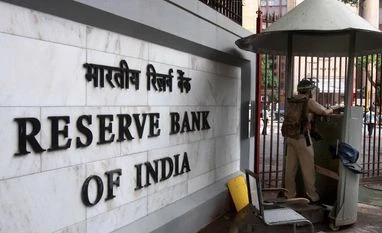RBI's $5 billion USD/INR swap expiry fuels dollar shortage concern
The Reserve Bank of India (RBI) had conducted a $5 billion sell/buy dollar/rupee swap last year. Under this swap, the RBI sold $5 billion to banks on April 28, 2022
)
Reserve Bank of India
Listen to This Article
The maturity of a central bank dollar/rupee swap transaction next week is prompting worries over the availability of dollars in the banking system, pushing forward premiums lower, foreign exchange traders said on Monday.
The Reserve Bank of India (RBI) had conducted a $5 billion sell/buy dollar/rupee swap last year. Under this swap, the RBI sold $5 billion to banks on April 28, 2022. At maturity on Oct. 23, the central bank will buy the dollars back.
"I think the fear is that RBI will take delivery of these dollars and not roll it over," a chief dealer at a mid-sized private sector bank said.
"That would mean that you could potentially have $5 billion taken out of the (banking) system."
Anticipating the dollar shortage, banks are conducting buy/sell swaps or receiving premiums for near deliveries, the banker said.
Also Read
In a buy/sell swap, a bank buys dollars on the spot date and sells them at a later date.
The gap between the exchange rates for purchase and sale is the forward premium.
In principle, forward premiums reflect the interest rate differentials between two currencies. They impact the cost of hedging for importers and exporters.
Speculation around the RBI swap maturity and buy/sell swaps by a state-run bank have resulted in continuous downside pressure on forward premiums, a senior trader at large private sector bank said.
The 1-month premium is down to 8 paisa from 11 paisa last Tuesday. In yield terms, the fall in the premium is nearly 50 basis points.
A large state-run bank has been conducting buy/sell swaps since Wednesday and offered a swap of nearly $1 billion in October on the interbank order matching system, two bankers told Reuters.
Meanwhile, the dollar/rupee cash swap rate fell on Monday, suggesting the banking system is already facing a dollar crunch.
The USD/INR cash/tomorrow swap rate was at 0.15 paisa, implying a rupee interest rate of about 6%. The overnight call rupee rate is at 6.80%.
If the RBI takes delivery of the dollars on Oct. 23, it will increase the supply of rupees, leading to offsetting measures, the chief dealer said.
(Only the headline and picture of this report may have been reworked by the Business Standard staff; the rest of the content is auto-generated from a syndicated feed.)
More From This Section
Don't miss the most important news and views of the day. Get them on our Telegram channel
First Published: Oct 16 2023 | 3:39 PM IST


